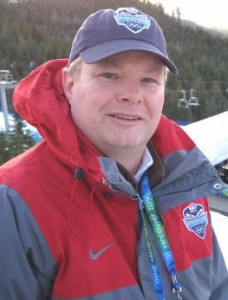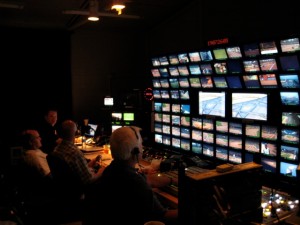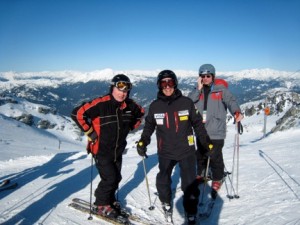Alumni Profiles is an ongoing series highlighting successful graduates who, with a SUNY education, achieved interesting and influential careers.
 Jim Carr is an innovator, traveler and renowned producer. Carr may be best known for his work as a television producer for such international events as the Summer and Winter Olympics and Tour de France, to name a few. Carr has been immersed in multimedia nearly his entire life—he helped grow an infant television station at college to a full-functioning organization that offered a multifaceted lineup within four years. Carr waived graduate school for field experience and then grew a portfolio of knowledge and networks to eventually lead his own Emmy Award-winning, fully-staffed production company.
Jim Carr is an innovator, traveler and renowned producer. Carr may be best known for his work as a television producer for such international events as the Summer and Winter Olympics and Tour de France, to name a few. Carr has been immersed in multimedia nearly his entire life—he helped grow an infant television station at college to a full-functioning organization that offered a multifaceted lineup within four years. Carr waived graduate school for field experience and then grew a portfolio of knowledge and networks to eventually lead his own Emmy Award-winning, fully-staffed production company.
[vimeo 51550169 w=500 h=281]
1. You attended SUNY Plattsburgh and got your start working with PSTV at the college. What was your involvement with the school’s television station and how did it reinforce your interest in the field?
 I started at WPLT the radio station my freshman year as a DJ and doing news/sports. Television was what I wanted to do from 10th grade in high school, so my goal was to get in the mix at PSTV as soon as I could. There was a 1 credit course that you could take and those folks made up PSTV. We produced a show called Videomontage, a magazine show that would air once a week, the occasional hockey game and some stuff here and there.
I started at WPLT the radio station my freshman year as a DJ and doing news/sports. Television was what I wanted to do from 10th grade in high school, so my goal was to get in the mix at PSTV as soon as I could. There was a 1 credit course that you could take and those folks made up PSTV. We produced a show called Videomontage, a magazine show that would air once a week, the occasional hockey game and some stuff here and there.
Once I got into that class in my sophomore year, I quickly realized that it would be great if we could expand what we showed on the channel: Campus Network (national college programming); The Beat (music videos we obtained from record companies); and Afterhours (a comedy/music show). Then, we moved into sports coverage to include basketball and hockey. We also added a nightly new update and had crews every night that would produce daily programming.
I was General Manager in my junior and senior years at PSTV and was proud that we went from a station that aired a few shows once in a while to a station that actually had a consistent amount of programming every night. PSTV gave me insight to the direction I wanted to take once I graduated to be behind the scenes on a TV show. I realized I really enjoyed bringing a team together that had a goal to accomplish in a program—the basis of what every producer should do –tie the technical, content and team together to deliver a message to the viewers.
2. And to continue that point, you now work with some of the biggest television networks and are self-employed. What was your journey like in-between college and running a production firm?
 I interned at WPTZ (Plattsburgh) my senior spring semester and upon graduation had planned to attend Syracuse University for my masters in Media Administration. However, WPTZ offered me a job and I deferred SU for a year. Then, I starting doing live sports programming at Channel 5 (WPTZ) and I deferred SU again.
I interned at WPTZ (Plattsburgh) my senior spring semester and upon graduation had planned to attend Syracuse University for my masters in Media Administration. However, WPTZ offered me a job and I deferred SU for a year. Then, I starting doing live sports programming at Channel 5 (WPTZ) and I deferred SU again.
After two deferments, I knew I was doing what I wanted to do in TV production and stuck with the Plattsburgh network. In 1988, I covered the Calgary Olympics for WPTZ and it opened up a whole new world for me. ESPN and other sports networks were coming on the scene and I got an opportunity in Lake Placid, NY to start doing sports productions full time. I began doing a lot of work for ESPN and other networks and this started my career in doing freelance sports productions.
Over time, I developed more experience, contacts and the need to expand what I could offer to clients. Now, Carr-Hughes Productions employs ten people who produce programming for all the major networks and we have five Emmy awards to show for it.
3. Your production work includes some more uncommon sports: curling, equestrianism, and MMA fighting, to name a few. Why do you stray from mainstream content and what challenges are associated with it?
![]() Having lived in Lake Placid early in my career, I was put in contact with Olympic sports like Skiing, Bobsled, and Luge. Because of my experience with those sports, ESPN, CBS and other major networks looked to me when they needed help.
Having lived in Lake Placid early in my career, I was put in contact with Olympic sports like Skiing, Bobsled, and Luge. Because of my experience with those sports, ESPN, CBS and other major networks looked to me when they needed help.
Part of producing is getting to understand the sport you are covering. I always loved the Olympics and the history of those sports so it just kind of drew me in; every sport has challenges, but they all have a winner, a loser and plenty of stories to tell.
4. You’ve covered nearly a dozen Olympics, high-profile horse races, and triathlons all over the globe. What are your most profound memories from some of these events? What is the most interesting thing you’ve ever experienced during your work?
I think the greatest thing about what I do is the fact that it is always different: Dealing with producing a show on the other side of the world; different people who handle things in different ways; different experiences. And then the travel—the places I have seen and the people that you meet.
 The Olympics are very special, as was The Tour de France. Traveling all over Europe covering that spectacle is one thing you never forget. Being the host broadcaster for the World Equestrian Games in 2010 was a huge project. It took us five years of planning and is one that remains special to me.
The Olympics are very special, as was The Tour de France. Traveling all over Europe covering that spectacle is one thing you never forget. Being the host broadcaster for the World Equestrian Games in 2010 was a huge project. It took us five years of planning and is one that remains special to me.
5. Overall, how did your college education help prepare you for life and your career?
That’s a big question. I think Plattsburgh set the table for me; I look back now and think about all of the twist and turns your life and career can take you on. Plattsburgh helped me start the journey by having a solid footing in the career I wanted.
6. What advice do you have to share with SUNY students?
It’s not always easy to know what you want to do when you graduate, but my suggestion is take advantage of what you have at school – the knowledge of the professors and staff, the facilities and the connections that you make – many of those people will help you as you go throughout your life.

